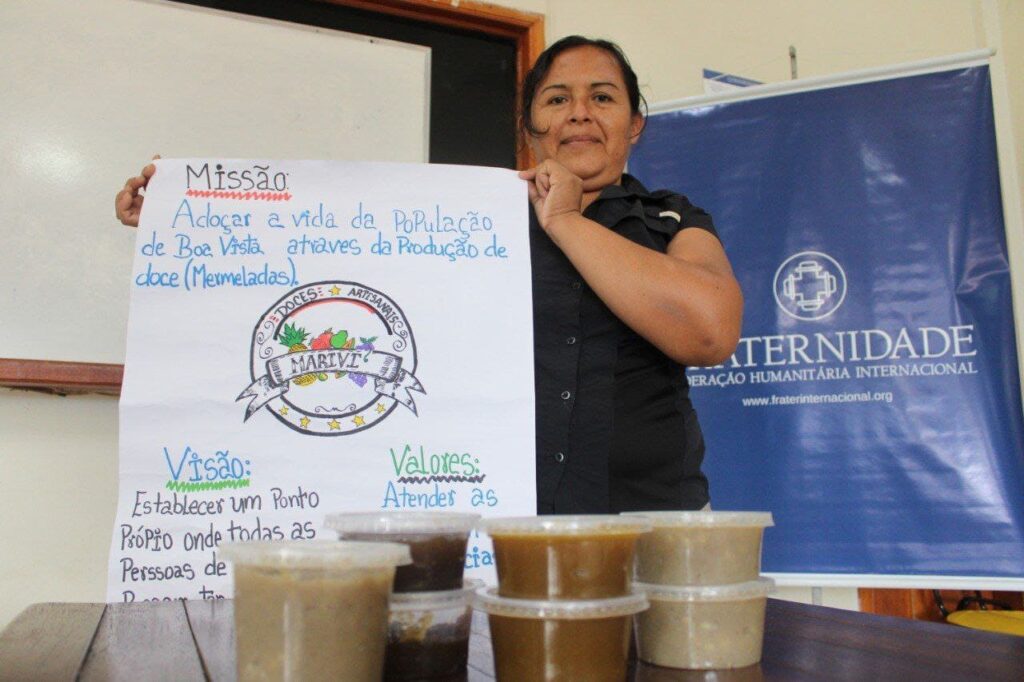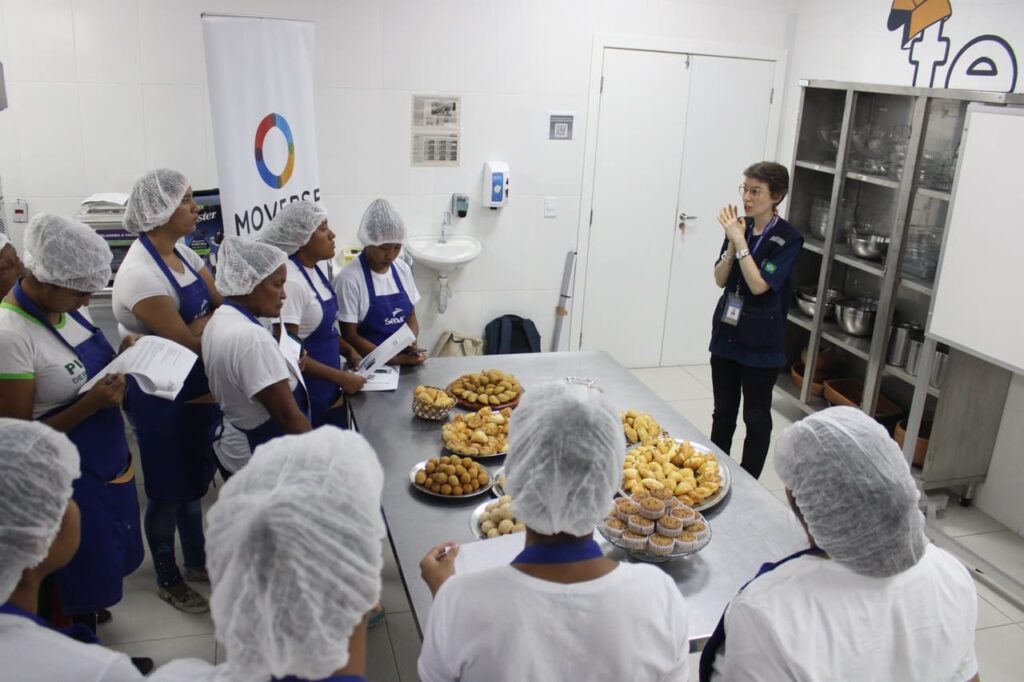From March to August of this year, the Fraternity – International Humanitarian Missions (FIHM), through the Indigenous Cultural and Training Center (CCFI) is carrying out, with the support of UN-Women and SENAC-Roraima, a series of courses offered free of charge to indigenous women assisted by the CCFI. The courses are part of an action plan to promote the economic empowerment of women.
Among the courses are: Confectionery, Savory Preparation, Bakery Techniques, Entrepreneurship – Attitudes and Planning, Basic Cutting and Sewing and Haircutting.
Sister Maria Raquel, regional coordinator of the Roraima Humanitarian Mission, comments that the partnership offers several training opportunities from the perspective of not only developing a work profile, but also an autonomous and entrepreneurial one.
“Enabling indigenous migrant and refugee women to participate in professional training courses meets the guarantee of livelihoods that contemplate and build socioeconomic inclusion for this segment that, on a daily basis, faces numerous barriers to effective integration in the host community,” emphasizes the coordinator.

In defense of the human rights of women
Created in 2010, UN Women aims to unite, strengthen and expand global efforts in defense of women’s human rights.
In Brazil, it works together with the Government and partners, in line with international commitments in the incorporation of perspectives on the rights of women and the black and indigenous populations.
One of the established partnerships is with the Fraternity – Humanitarian Missions (FIHM), through the Indigenous Cultural and Training Center (CCFI), based in Boa Vista – Roraima, a state that is home to around 2,500 Venezuelan indigenous people, according to UNHCR data, and several other ethnic groups from Guyana, as well as indigenous Brazilians from the state of Roraima and the North Region.

Gender equality and the empowerment of women
Mariana Salvadori, project manager at UN Women and the Moverse Program, through which training is carried out jointly with the Fraternity – Humanitarian Missions (FIHM), talks about the importance of the Sustainable Development Goals established by the UN, with emphasis on number 5, which addresses gender equality and the empowerment of all girls and women, to overcome poverty among indigenous migrants and refugees.
She points out that SDG 5 brings in the word “ALL” the concern with an intersectional approach to human rights, which includes all groups of women, so that there is progress in the themes of gender equality, women’s empowerment, improvement of conditions of life or their protection in situations of violence.
And she continues: “In this sense, the 2030 agenda, which works as a set of guiding principles for us to reach the society we want, is very clear in recommending that our actions are always inclusive and that we work on the specificities of women when preparing and supporting local actors in the development of strategies to reduce gender inequalities and economic empowerment. Part of the problems that face indigenous refugee and migrant women in Brazil are specific and, therefore, it is important to start from a specific approach and that is built, especially, on listening to these women and their main demands.”
Regarding the training offered, Mariana says that the themes were defined based on listening to the main demands of women, such as entrepreneurship and professionalization courses in areas which they can undertake. In addition to training in areas with a greater possibility of hiring, aiming at the needs of the market, the courses offer some basic management techniques and how to organize your business.

She stresses the importance of UN Women’s partnership with the Fraternity – Humanitarian Missions (FIHM). “It is very important for UN Women that civil society organizations, governments and also the private sector can look at refugee and migrant women with conscience and seeking each one, in their scope of action, to promote measures and take attitudes to reduce the gender inequalities and contribute to a greater and better socioeconomic insertion of Venezuelan women in Brazil. In this sense, working with the Fraternity is key so that good practices and good results are extended to more women.”
UN Women’s consultant for the Move program, Erika Hurtado, highlights the challenge of promoting the socioeconomic autonomy of indigenous women while preserving their identity and ancestral cultural roots:
“From our experience, women are always very clear about their main demands and needs and, above all, their proposals to meet their own demands. Thus, they have always shown great concern for the family and the community, emphasizing that an indigenous woman only feels empowered when other indigenous women have access to the same opportunities. In other words, the economic empowerment of indigenous women is understood as a profoundly collective process and that is how it should be approached.”
“Building proposals that align with this logic continues to be a major challenge. Regarding the preservation of ancestral practices, the Welcoming Operation has been implementing actions that value indigenous knowledge, such as making spaces available for the preservation of customs and traditions, including spaces for indigenous children and the creation of scenarios and activities for artistic and cultural expression and exchange.
Many indigenous women find in crafting and traditional foods a possibility of income generation, as well as in the exercise of language interpretation activities, cultural mediation, teaching and other professional activities,” complements Erika Hurtado.

Impacts of training on the lives of indigenous women
“We were pleased to meet women with a great interest in acquiring knowledge of the Brazilian context to talk and enrich the knowledge that they already have, historically. So far, most of the courses they have attended have been in the area of gastronomy, and they claim to have found ways to combine some traditional Venezuelan foods with traditional foods from northern Brazil. We even know that they are maturing the idea of a collective for food preparation,” comments Erika Hurtado.
“The new techniques and knowledge we received during training in baking and confectionery have helped us a lot. We are even preparing bread to sell at Intercultural Fairs. Now, my dream is to learn how to decorate food,” points out Micaila R. P. Houston, from the Akawaio ethnic group.
The indigenous Discarlis C. R. Jaramillo, from the Warao ethnic group, gratefully tells how much the training has contributed to improving her family’s quality of life: “I’m learning many new things and I know I have to keep practicing. I have four children, and my husband and I want to get organized and try our own business in the future.”
The volunteer humanitarian actor of the Fraternity – Humanitarian Missions (FIHM), Lucía Alvarez Reyes, who accompanied the indigenous people during the courses on Preparing Salted Food, Baking and Confectionery, explains that these training courses are part of the Continuing Training Program for Development (PFCD) carried out by the CCFI, and aims to “encourage the integral development of participants through the mobilization of human skills and technical tools relevant to their life path and productive insertion in the world of work, so that the individual can conquer their autonomy, assuming responsibility and protagonism in personal and collective life.”

The humanitarian worker talks about the indigenous people’s enthusiasm during the training sessions and their desire to learn new things. “When a course ends, they immediately ask which ones will be next, because they always want to learn more.”
Erika Hurtado also points out that “at the community level, indigenous women have expressed their commitment to stimulating and encouraging the participation of other women in training and information initiatives, through sharing the benefits of experiences and strengthening family and community ties.”






